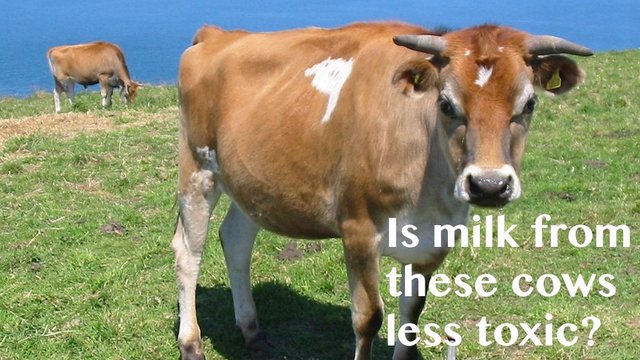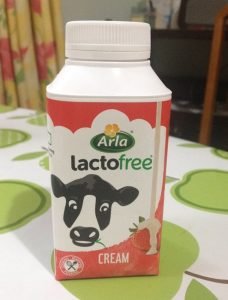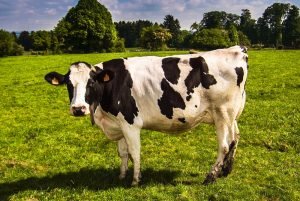New insight into cow's milk intolerance: the clue is in the breed

Last week I posted about the embarrassing, inconvenient and sometimes excruciating cow's milk intolerance that I've suffered for over 20 years – and how it seems to be getting better. In July 2017 I was overjoyed to find that I could enjoy a scone with jam and cream without adverse symptoms. Since then, I've often enjoyed cream cakes, and I really indulged myself over Christmas.
I've also managed to eat cheese sauce made with cow's milk Cheddar, and on a couple of occasions I even drank a latte made with cow's milk instead of soy milk. At one point I felt ready to shout from the rooftops that my cow's milk intolerance had been cured.
But as with so many things in life, it just wasn't that simple!
First of all, I have had a few digestive upsets recently. I put it down to a nasty stomach bug between Christmas and New Year that had laid me flat. But... stomach bugs don't usually come back a couple of weeks later in a milder form. I started to wonder whether the "stomach bug" was actually a reaction to all the dairy I'd been stuffing myself with over Christmas.

Trying lactose-free cream taught me that lactose intolerance is not my problem!
The other really bizarre thing was my reaction to lacto-free cream. I'd spotted it in the supermarket a few months ago and decided to try it. Shortly after eating some of it, I had a terrible digestive reaction which kept me up till 2am with stomach pains and urgent toilet trips.
I could not understand why I was able to eat dairy cream without any adverse reaction, yet lacto-free cream made me ill.
One of my friends suggested that I might have a casein intolerance. Another lightbulb moment!
A bad case of casein intolerance
Cow's milk intolerance is increasingly common these days, and it's usually assumed to be a reaction to lactose, which is a milk sugar. Casein is a milk protein and it's been known for decades that it can also trigger allergic and less serious reactions, yet for some reason, casein sensitivity is not as widely publicised as lactose intolerance.
Maybe this is because the issue is quite complex, with many unanswered questions. Firstly, it seems that not all types of casein are problematic. One type of casein in particular is believed to be responsible for most childhood casein allergies, and it has also been suggested as a possible factor in a whole host of health issues, including leaky gut, autoimmune conditions, autism, heart disease, Type 1 diabetes, schizophrenia and even dyslexia.
Beta-casomorphin 7, or BCM7, is a bioactive peptide released only from a certain class of milk, known as A1. Holstein and Friesian cows, which are the predominant cattle breed in most of Europe, North America and Australia, produce mostly A1 milk, while breeds like Jersey and Guernsey cows, as well as most African and Asian cows, produce mostly milk classed as A2.
A2 milk contains a different type of casein, and does not release BCM7.
It's not as simple as only consuming milk products from Jersey or Guernsey cows. Most cows produce a mixture of A1 and A2 milk (see the table on the third page of this research paper) and specific breeding and testing procedures have to be carried out in order to ensure that a milk product contains no A1 or BCM7.

Left: Jersey and Guernsey cows usually give more A2 type milk. Image source Right: Highland cattle are very cute, but I haven't been able to find out anything about the type of milk they produce. Image source
Research conducted in 2016 found that consumption of milk containing A1 beta-casein was associated with increased gastrointestinal inflammation, digestive discomfort, longer gastrointestinal transit times and decreased cognitive processing speed and accuracy; and that drinking A2 milk did not aggravate these symptoms.
These findings have led to one company using selective breeding in order to produce milk that is free of A1 beta-casein. The A2 Milk Company produces milk from cows that exclusively produce A2 milk.
Confused? I'll attempt to simplify it...
Casein is a milk protein. Many people are sensitive to one particular casein, known as BCM7, which is only associated with a particular milk type known as A1.
To confuse matters, reactions to cow's milk intolerance can occur quite a long time after consumption, so it can be really difficult to pinpoint. In my own case there seems to be a tipping point. If I consume a lot of cow's milk I get a more immediate reaction.
Milk from sheep and goats
I've been able to happily digest goat's milk products for years, and that might be because goat's milk is very low in A1 caseins and much higher in A2 caseins. According to this study (downloads a pdf), ewe's milk has less A1 casein than cow's milk, but more than goat's milk.
Casein is a protein, and there is very little of it in high-fat dairy products like butter and cream. This may explain why I was able to eat that scone with jam and cream, without any digestive trouble.
It may also explain why I've been able to eat butter without problems. I used to think this was because butter is usually eaten in small amounts – and that probably is part of it. But in addition, as a high-fat dairy product, butter contains very little casein of any type.
Casein is also used as an additive for many food products, sometimes as a thickener, or as a fining agent for white wine. Not all caseins are the same, and just because a product has added casein, it doesn't necessarily mean this is the feared BCM-7 type of casein.
Caseinates derived from milk are often used in white wine production. Research suggests that the amounts left in the wine are too low to be allergenic, however it's interesting that around the same time that my cow's milk intolerance developed I completely lost the taste for white wine and stopped drinking it, as it often made me feel nauseous – and not just when I had a hangover!
Several friends had a similar reaction. Recently I've started occasionally drinking white wine again. I wonder if this is because production methods have improved over the years, with manufacturers becoming more careful over the use of potential allergens.

If you visit your doctor because of frequent digestive upsets, you're unlikely to be diagnosed with casein intolerance. You're more likely to be given a series of blood tests and bowel examinations – which is appropriate, as there could be a more serious cause. Casein intolerance will be the last thing suspected, because despite the amount of scientific research that has been conducted in this area over the past few decades, there is very little conclusive research or large-scale trials.
I've noticed that some people (some of my relatives) seem to enjoy cow's milk every day and lead long, healthy lives. But for me personally, there are so many questions around casein, and especially BCM-7 or casomorphins, that I will continue to avoid cow's milk products. My body seems to be warning me against it.
I'll still have the occasional treat with cream (ironically the fattier the better!) and I'll continue to eat some butter, goat's milk and goat's yogurt. But I'll be avoiding the cheese sauce, unless I make it myself, from goat's cheese.

Main photo source
Unsourced photo is author's own.
Part one: Twenty years of cow's milk intolerance... cured?
Posted from my blog with SteemPress : http://ramblingandscrambling.co.uk/health/new-insight-into-cows-milk-intolerance-the-clue-is-in-the-breed/

.gif)




Congratulations! This post has been chosen as one of the daily Whistle Stops for The STEEM Engine!
You can see your post's place along the track here: The Daily Whistle Stops, Issue 391 (02/05/19)
I honestly think the first problem of it all is that we started trying to control everything. We started to control how cows are feed, where they sleep, how much and what they eat and it has messed up the natural order of things. And, in that way is has messed up the quality of milk which cows produce.
They are saying now all milk should be pasteurized or it is not good to drink? Which makes no sense to me. As the big milk industries cage their cows, feed them with crap and inject them with crap, and that is ok compared just letting cows be on the pasture all day, on fresh air, eating grass instead of the crap they feed so they produce more milk at a faster rate.
I think we are feeding the cows something which should not naturally be in their system and in return it messes with our body as well. But, that is just my personal opinion about it. :)
Thank you for sharing this interesting topic with us. Well written, and organized. It shows you took your time to write this one. :)
Great job. Have an amazing day. :)
Thanks for your comments @awakentolife - you've made some very interesting points! I really enjoyed writing and researching this because it's such a fascinating subject. I really agree about the way many farm animals are treated. I used to think goats were raised in better conditions, because they are farmed on a smaller scale, but then I found out that goats are generally treated the same way as cows on farms, raised in a highly controlled manner in quite artificial conditions.
I think it does make a difference, as Isle of Mull cheese is one of the most delicious cheeses from Scotland, and the cows that produce it are raised organically in free range conditions. This is just one example I know about, because I used to run a cafe, and my Isle of Mull cheese sandwiches were incredibly popular!
I buy my eggs and vegetables from an organic company, and I've visited the farm - their chickens live out in the field, as do their pigs (although I don't eat meat).
Though I'm not sure if this is the reason for the difference in A1/A2 milk. I've read that it's believed that cows started to produce A1 milk between 5,000 and 10,000 years ago, when people started migrating with them to northern Europe. This opens so many fascinating possibilities, and I want to learn more about it. There are so many questions in this whole topic.
There are sure many questions about this topic no doubt. I am interested in how your ongoing research will turn up.
Looking forward to your next post about it. :)
WOW this was so interesting to read I never would have thought different types of cow milk could have a different effect on people, I am glad you are finding out these things to enable you to have more variety
Thanks @tattoodjay! It is incredible when you think about it.
It truly is